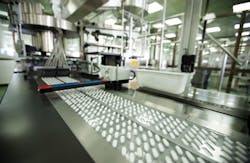Big Chinese pharmaceutical companies are no longer happy playing only in their local markets. Instead, they plan to take advantage of the far greater opportunities presented by global markets. Several of them are hoping to establish a notable presence on the U.S. market, mostly through partnerships with international industry giants, China Daily has reported.
Zhejiang Hisun Pharmaceutical Co. was one of the first that made a move towards entering the United States, by forming a joint venture with American Pfizer Inc., the biggest drug producer in the world by sales, in September last year. Similarly, Simcere Pharmaceutical Group set up a partnership with Merck & Co. and Bristol-Myers Squibb Co., while Chinese biotech company Sino Biological Inc. and Life Technologies Corp. started a collaboration for protein product distribution and development. Another example of the trend is Shanghai Fosun Pharmaceutical Group, which recently bought shares in U.S.-based medical care company Saladax Biomedical Inc. and became its largest single shareholder.
Tapping and promoting
Industry experts comment that these partnerships are driven by Chinese companies’ ambitions to tap international markets and to promote their brands through global platforms. On the other hand, U.S. and international companies are interested in using their Chinese partners’ distribution networks and knowledge of the local market in a bid to grab a bigger market share. This is a win-win situation and both companies should be pleased with the opportunities that open up for their business, comments Zhang Fabao, a member of the China Pharmaceutical Technology Organization Expert Committee.
When Hisun gained a controlling stake in its joint venture with Pfizer, the company managed to make a breakthrough in the Chinese pharmaceutical industry. It owns 51% of Hisun-Pfizer Pharmaceuticals Co, with a registered capital of $250 million and total investment of $295 million. A senior official at Hisun told China Daily that the negotiations between the two companies took more than a year and numerous discussions of details.
Joint goals
The main goal of the joint venture is to manufacture and distribute branded generics — low-price off-patent medicines of high-quality — not just in China but also internationally. Some 75 products in the portfolio have been developed and manufactured by Hisun, while Pfizer contributes eight medicines, along with development, marketing and manufacturing solutions. The joint venture relies on a broad distribution network and expertise in production of generics, China Daily notes.
Commenting on the joint venture, Xu Lingni, analyst at domestic brokerage China Investment Consulting Co., says that it would facilitate Hisun’s transformation into a branded generics company. Since its launch in 1956, Hisun has been focusing on manufacturing active ingredients. Its business went international in 1989, when the company received overseas registration. Currently, about 80% of its active pharmaceutical ingredients (API) products are sold abroad, in over 30 countries and regions. However, Xu noted that the added value of API was going down and Hisun needed a change in direction. Manufacturing branded generics is a profitable and practical way to achieve this, he concludes.
